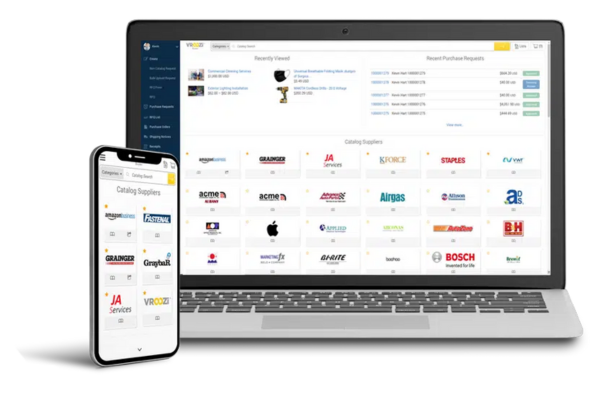Leveraging the Procurement Marketplace for Small Organizations
by Ankita Tripathy Small Business Published on: 01 February 2025 Last Updated on: 08 May 2025

Due to limited supplier leverage, inefficient purchasing processes, and a lack of resources, procurement can be challenging for small enterprises. However, procurement marketplaces and online platforms that connect suppliers and customers are transforming the way small businesses acquire products and services.
These marketplaces offer a number of benefits, from increased transparency and efficiency to lower costs and a wider range of suppliers. But is that all?
If you want to know more about procurement marketplace, keep reading this blog till the end…
The Role of Procurement Marketplaces

An online platform called the procurement marketplace allows companies to buy products and services from various vendors.
Better prices and higher-quality services result from these platforms’ centralization of procurement procedures, vendor administration simplification, and supplier competition augmentation.
These marketplaces give small businesses the chance to:
- Lower procurement expenses by offering competitive prices.
- Get in touch with more suppliers, especially those who specialize in specialized goods.
- Simplify and automate the purchase process.
- Increase the purchasing process’s transparency.
- Verify adherence to quality standards and procurement laws.
Key Opportunities
1. Access to a Wider Supplier Base
Finding reliable suppliers can be challenging for small businesses. Procurement platforms give companies access to a large network of vetted vendors, enabling them to assess terms of delivery, quality, and pricing.
Small businesses can reduce their dependence on a single vendor by diversifying their supply sources and obtaining better deals because of this extensive access.
Prominent procurement platforms that give access to millions of suppliers worldwide include Alibaba, Amazon Business, and SAP Ariba. These platforms have made it possible for small businesses to research international buying opportunities that were previously exclusive to major organizations.
2. Cost Savings and Competitive Pricing
One of the main benefits of using procurement marketplaces is cost-effectiveness. Small businesses can purchase goods and services at reduced prices through bulk purchases, competitive bidding, and negotiated contracts.
Additionally, many platforms offer tiered pricing models, which allow businesses to access better rates as their purchasing volume increases.
Finally, real-time price comparisons across multiple suppliers guarantee that small businesses get the best value for their money.
3. Streamlined Processes
Digital solutions made available by procurement markets make procurement administration easier. Effective procurement management for small firms is facilitated by features like spend analytics, computerized invoicing, and automated purchase orders.
These automation features decrease human mistake in order and payment processing, cut down on manual labor, and do away with paperwork.
Platforms such as Coupa and Procurify, for instance, provide cloud-based solutions that let small firms easily handle every stage of the procurement process.
4. Supplier Diversity and Ethical Sourcing
By incorporating women-owned, minority-owned, and small businesses within their vendor networks, several procurement platforms place a high priority on supplier diversity.
This enables small businesses to uphold corporate social responsibility (CSR) programs and ethical sourcing guidelines while supporting a variety of vendors.
Furthermore, small enterprises can buy sustainable and eco-friendly items through sustainability-focused procurement marketplaces like EcoVadis and Green Procurement, which guarantee adherence to environmental rules.
5. Improved Transparency and Compliance
Procurement markets ensure increased transparency by offering clear insights into product quality, supplier credentials, and pricing.
These platforms frequently come with integrated compliance tools that assist small firms in following industry rules, preventing fraud, and efficiently managing supplier risks.
For example, companies may keep an eye on supplier certifications, contract adherence, and regulatory compliance with the use of compliance tracking solutions provided by procurement platforms such as SAP Ariba and Jaggaer.
6. On-Demand and Just-in-Time Procurement
Maintaining large inventories is difficult for small enterprises since they frequently encounter cash flow limitations.
Just-in-time (JIT) and on-demand procurement are made possible by procurement markets, which allow companies to acquire products just when they are needed, cutting waste and storage expenses.
Small companies are the focus of marketplaces such as Tundra and Faire. They enhance cash flow management by enabling them to buy inventory in smaller amounts without being constrained by minimum order requirements.
7. Integration with Digital Payment Solutions
Small businesses may process payments safely and effectively thanks to the integration of digital payment platforms with the majority of procurement markets.
Small businesses may better manage their finances with features like installment plans, credit lines, and deferred payment choices.
Alibaba and Amazon Business, for instance, provide trade credit options that let companies make purchases now and pay later, increasing their financial flexibility.
8. Enhanced Negotiation and Bidding Opportunities
Reverse auctions, in which providers vie to give buyers the best price, are available on certain procurement markets. Through this procedure, small businesses can obtain advantageous prices without engaging in protracted haggling.
Platforms such as ProcurePort and GEP SMART offer e-sourcing technologies that enable competitive bidding, assisting small firms in lowering procurement expenses and securing premium products at the most competitive price.
9. Scalability
Small firms’ buying requirements change as they expand. Marketplaces for procurement provide scalable solutions that may be adjusted to meet evolving corporate needs.
Subscription-based services are offered by many platforms, enabling companies to add features as they grow.
For instance, when its purchasing volume rises, a small business that first uses Amazon Business’s basic procurement capabilities can eventually upgrade to enterprise-level functionality.
Challenges and Considerations

While procurement marketplaces offer numerous benefits, small organizations should also be aware of potential challenges:
- Supplier Reliability: Not all suppliers on procurement marketplaces are equally reliable. Due diligence is required to ensure quality and timely delivery.
- Hidden Costs: Some platforms charge transaction fees or subscription costs, which should be considered when evaluating pricing.
- Integration with Internal Systems: Small businesses must ensure the procurement platform integrates smoothly with their existing accounting, inventory, and ERP systems.
- Data Security: Digital procurement involves sharing sensitive business information. Small organizations should choose marketplaces with robust security measures.
Best Practices
To maximize the benefits of procurement marketplaces, small organizations should adopt the following best practices:
- Define Procurement Needs: Clearly outline purchasing requirements, budget, and quality expectations before selecting a platform.
- Compare Multiple Platforms: Evaluate different procurement marketplaces based on pricing, supplier diversity, and features.
- Leverage Automation Tools: Use digital procurement tools to streamline order management, invoicing, and payments.
- Monitor Supplier Performance: Regularly assess supplier reliability, product quality, and service levels.
- Negotiate Contracts: Explore opportunities for volume discounts and better payment terms through negotiations.
- Ensure Compliance: Verify supplier credentials and regulatory compliance to avoid legal risks.
Bottom Line
Procurement marketplaces provide small businesses a previously unheard-of chance to improve efficiency, cut expenses, and streamline purchases.
Small firms can access a wide range of suppliers, bargain for lower prices, and expand their operations in a sustainable manner by utilizing digital procurement platforms.
Small businesses that implement digital procurement strategies will be well-positioned to compete successfully in the market as technology continues to transform the procurement process.
Small firms can use procurement as a strategic advantage that propels long-term growth and success by comprehending the advantages of procurement markets and best practices.



































































































